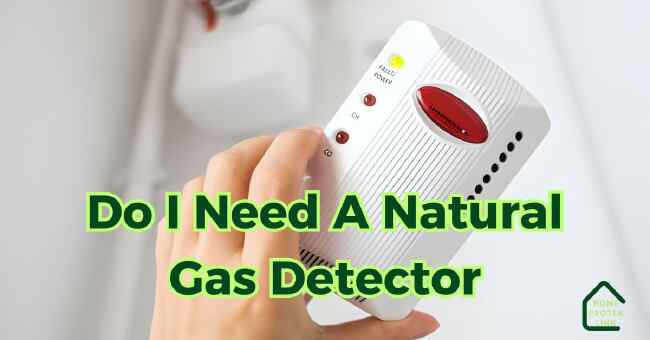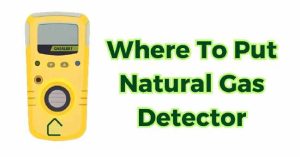Table of Contents
Do I Need a Natural Gas Detector? Yes. As a homeowner, you need a natural gas detector in your home.
When my neighbor, Sarah, lost her home and nearly her life due to a gas leak, it hit me hard.
The explosion rocked our quiet street, and the sight of Sarah’s once cozy home reduced to rubble was heartbreaking.
As I comforted her, I realized that this tragedy could have been prevented with a simple device – a natural gas detector.
Sarah’s story is not unique; countless lives are affected by gas leaks every year.
In this comprehensive guide, I’ll explain the importance of natural gas detectors and how they can keep your family safe, so you can avoid the pain and loss that Sarah experienced.
Overview: Do I Need A Natural Gas Detector?
Natural gas is a widely used fuel source that is both efficient and cost-effective. However, it is essential to understand the potential risks associated with natural gas leaks.
A gas leak can lead to health hazards, fire, and even explosions, making gas safety a top priority for homeowners.
By installing a natural gas detector, you can significantly increase your home safety and protect your loved ones from the dangers of gas leaks.
Understanding Natural Gas
What is Natural Gas?
Natural gas is a fossil fuel composed primarily of methane, a colorless and odorless gas. It is formed deep beneath the Earth’s surface through the decomposition of organic matter over millions of years.
Natural gas is extracted from the ground through drilling and is then processed and distributed to homes and businesses via pipelines.
Properties Of Natural Gas
Natural gas is lighter than air, which means that it will rise and disperse when released into the atmosphere. It is also highly flammable and can ignite easily in the presence of a spark or flame.
In its natural state, natural gas is odorless, but utility companies add a distinctive, sulfur-like odor to help detect leaks.
How Natural Gas Is Used In Homes
- Heating: Natural gas is commonly used to fuel furnaces, boilers, and space heaters, providing warmth during colder months.
- Cooking: Gas stoves and ovens are popular choices for many homeowners due to their quick heating and precise temperature control.
- Water heating: Natural gas water heaters are efficient and can quickly supply hot water for showers, washing dishes, and laundry.
The Risks of Natural Gas Leaks
While natural gas is a convenient and efficient fuel source, it can also pose serious risks if a leak occurs. Let’s explore the potential dangers associated with gas leaks.
Health hazards
- Asphyxiation: In high concentrations, natural gas can displace oxygen in the air, leading to asphyxiation. Symptoms of asphyxiation include dizziness, fatigue, nausea, and loss of consciousness.
- Carbon monoxide poisoning: When natural gas doesn’t burn completely due to insufficient oxygen, it can produce carbon monoxide, a toxic gas. Carbon monoxide poisoning can cause flu-like symptoms, disorientation, and even death.
Fire and explosion risks
Natural gas leaks can create a highly combustible atmosphere. If the leaked gas accumulates and comes into contact with an ignition source, such as a spark or flame, it can result in a fire or explosion. The consequences can be devastating, leading to property damage, injuries, and even loss of life.
Environmental Concerns
Methane, the primary component of natural gas, is a potent greenhouse gas. When natural gas leaks occur, methane is released into the atmosphere, contributing to climate change and global warming.
Identifying Natural Gas Leaks
Knowing how to recognize the signs of a natural gas leak is crucial for ensuring your safety. Here are some common indicators:
Olfactory signs: The distinctive smell of natural gas
As mentioned earlier, utility companies add a strong, sulfuric odor to natural gas to help detect leaks. If you smell a rotten egg or sulfur-like odor in your home, it could be a sign of a gas leak, and you should take immediate action.
Auditory signs: Hissing or whistling sounds
A hissing or whistling sound near a gas line, appliance, or meter could indicate a natural gas leak. This sound is caused by gas escaping from a damaged or poorly fitted connection.
Visual signs: Dying plants, bubbling water, or blowing dust
If you notice dying plants, bubbling water, or blowing dust near a gas line or appliance, it could be a sign of an underground gas leak. These visual cues are caused by gas escaping and disturbing the surrounding environment.
Physical Symptoms: Dizziness, Nausea, or Headaches
Exposure to natural gas can cause physical symptoms such as dizziness, nausea, headaches, and fatigue. If you experience these symptoms and suspect a gas leak, leave the area immediately and seek fresh air.
| Signs of a Natural Gas Leak | Description |
|---|---|
| Smell | Rotten egg or sulfur-like odor |
| Sound | Hissing or whistling near gas lines or appliances |
| Sight | Dying plants, bubbling water, or blowing dust |
| Physical Symptoms | Dizziness, nausea, headaches, or fatigue |
The Role of Natural Gas Detectors
Natural gas detectors play a vital role in ensuring the safety of your home and family. These devices are designed to detect the presence of natural gas and alert you to potential leaks, allowing you to take prompt action to mitigate the risk.
How Natural Gas Detectors Work
Natural gas detectors use advanced sensors to continuously monitor the air for the presence of natural gas. When the sensor detects a certain level of gas, it triggers an alarm to alert you to the potential danger.
Most detectors are calibrated to sound an alarm when the gas concentration reaches a specific threshold, typically well below the level at which the gas becomes explosive.
Types of natural gas detectors
- Standalone Detectors: These detectors are designed to detect only natural gas and are ideal for homes that use natural gas appliances.
- Combination Detectors: These detectors can detect multiple gases, including natural gas, propane, and carbon monoxide, providing comprehensive protection for your home.
- Smart Detectors: Smart natural gas detectors can connect to your home’s Wi-Fi network and send alerts to your smartphone or other devices when a leak is detected. Some models also integrate with smart home systems, allowing you to monitor your home’s safety remotely.
The importance of early detection and warning
Early detection of natural gas leaks is crucial for preventing accidents and ensuring the safety of your home and family. By installing a natural gas detector, you can be alerted to potential leaks before they become dangerous, giving you time to take appropriate action, such as evacuating the area and contacting your gas company or emergency services.
Choosing the Right Natural Gas Detector for Your Home
When selecting a natural gas detector for your home, there are several factors to consider to ensure you choose a reliable and effective device.
Factors to consider when selecting a detector
- Sensitivity and accuracy: Look for detectors with high sensitivity and accuracy ratings to ensure they can detect even small gas leaks.
- Battery life and backup power: Choose a detector with long battery life and a backup power source to ensure continuous protection even during power outages.
- Ease of installation and maintenance: Consider the installation process and maintenance requirements when selecting a detector. Some models are designed for easy DIY installation, while others may require professional help.
Recommended placement of detectors
For optimal protection, it is essential to place natural gas detectors in strategic locations throughout your home. Here are some recommended placement guidelines:
- Install detectors near gas appliances, such as stoves, furnaces, and water heaters.
- Place detectors on every level of your home, including the basement and attic.
- Avoid placing detectors too close to windows, doors, or vents, as drafts can interfere with their performance.
Maintenance and testing of detectors
Regular maintenance and testing of your natural gas detectors are crucial for ensuring they function properly when needed. Follow these tips to keep your detectors in top condition:
- Test your detectors monthly by pressing the test button to ensure the alarm sounds.
- Replace the batteries in your detectors at least once a year, or as recommended by the manufacturer.
- Vacuum or dust your detectors regularly to prevent dirt and debris from clogging the sensors.
- Replace your detectors every 5-7 years, or as recommended by the manufacturer, to ensure optimal performance.
Responding to a Natural Gas Leak Alert
If your natural gas detector alerts you to a potential leak, it is essential to take immediate action to ensure your safety and the safety of others.
Evacuation procedures
- Immediately evacuate the area and ensure that all family members and pets are accounted for.
- Do not turn on or off any electrical appliances or switches, as this can create a spark and ignite the gas.
- If possible, open windows and doors to ventilate the area as you exit.
Contacting emergency services and your gas company
Once you have safely evacuated the area, contact your local emergency services and gas company immediately. Provide them with your location and inform them of the suspected gas leak. Follow their instructions and do not re-enter the area until it has been deemed safe by professionals.
Preventing ignition sources: What not to do during a gas leak
During a gas leak, it is crucial to avoid creating any ignition sources that could spark a fire or explosion. Here are some actions to avoid:
- Do not smoke or use lighters or matches.
- Do not turn on or off any electrical appliances or switches.
- Do not use your phone inside the affected area, as it can create a spark.
- Do not start or stop vehicles near the affected area, as this can also create a spark.
Natural Gas Detector FAQs
Are natural gas detectors required by law?
While natural gas detectors are not typically required by law, some local building codes may mandate their installation in new homes or during significant renovations. However, regardless of legal requirements, installing a natural gas detector is a wise investment in your home’s safety.
How often should I replace my natural gas detector?
Manufacturers generally recommend replacing natural gas detectors every 5-7 years to ensure optimal performance. Over time, the sensors in the detectors can become less sensitive, reducing their effectiveness in detecting leaks.
Can carbon monoxide detectors detect natural gas leaks?
No, carbon monoxide detectors are designed to detect only carbon monoxide and cannot detect natural gas leaks. It is important to have both carbon monoxide and natural gas detectors installed in your home for comprehensive protection.
Are natural gas detectors expensive?
The cost of natural gas detectors varies depending on the type and features offered. Basic standalone detectors can cost as little as $20, while more advanced combination or smart detectors can range from $50 to $200. Considering the potential risks associated with natural gas leaks, investing in a quality detector is a small price to pay for peace of mind and safety.
Can I install a natural gas detector myself?
Many natural gas detectors are designed for easy DIY installation and come with detailed instructions. However, if you are unsure about the installation process or have concerns about the placement of the detector, it is always best to consult with a professional to ensure proper installation and optimal performance.
Conclusion
Protecting your home and family from the dangers of natural gas leaks is essential, and installing a natural gas detector is a critical step in ensuring your safety. By understanding the risks associated with natural gas, knowing how to identify leaks, and having a reliable detector in place, you can significantly reduce the risk of accidents and provide peace of mind for you and your loved ones.
We encourage all homeowners to invest in natural gas detectors and to regularly maintain and test them to ensure they are functioning correctly. By taking a proactive approach to gas safety, you can create a safer living environment and protect what matters most.
For more information on natural gas safety and detectors, consult the following resources:
- National Fire Protection Association (NFPA) – Natural Gas Safety
- American Gas Association – Natural Gas Safety
- Consumer Product Safety Commission (CPSC) – Gas Appliance Safety
Remember, when it comes to the safety of your home and family, there is no such thing as being too cautious. Invest in a natural gas detector today and enjoy the peace of mind that comes with knowing you are protected against the dangers of gas leaks.





Pingback: Where To Put Natural Gas Detector - homeprotexlink